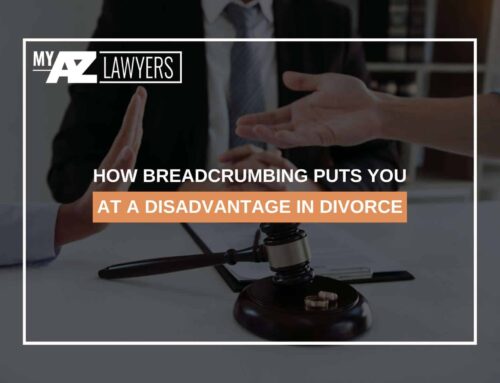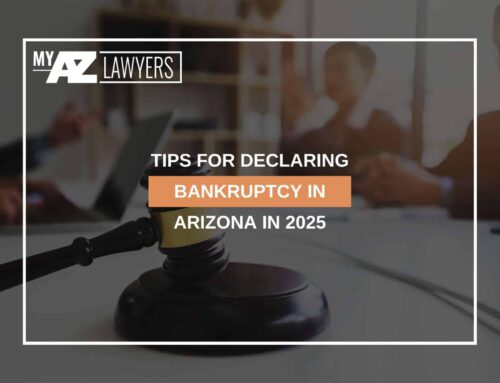Table Of Contents
Arizona’s Bankruptcy Exemption Waiting Periods
Sometimes, potential clients come to us reluctant about filing for bankruptcy because they believe they will be forced to give up all of their possessions. It is a legitimate concern, because the trustee can seize debtors’ assets and sell them at bankruptcy auction. But this is only true if the assets can’t be protected by bankruptcy exemptions. A debtor can use exemptions to protect their house, car, clothing, and other possessions in bankruptcy. These are the types of items that are necessary to maintain a reasonable lifestyle both during and after bankruptcy. It is crucial to protect them if you clear your debts, or you could end up in a negative financial situation all over again. Read on to learn more about Arizona’s residency requirement for bankruptcy exemptions. If you’d like more information about filing for bankruptcy in Arizona, contact our Arizona law firm for your free consultation at 480-470-1504.

Exemption Waiting Periods
A bankruptcy debtor can’t file their petition wherever they see fit, and generally must meet residency requirements before they can benefit from a jurisdiction’s legal system. Residency requirements are how much time a person must spend in an area before filing a certain type of case. To be eligible to file for bankruptcy in Arizona, a debtor must have lived in the state for the greater part of 180 days, or 6 months. This phrasing allows for snowbirds and other part-time residents to still declare bankruptcy in Arizona. But meeting Arizona’s residency requirement to file doesn’t necessarily mean the debtor meets Arizona’s residency requirement to use bankruptcy exemptions.
While a debtor only needs to reside in Arizona 180 days to meet the filing residency requirement, the residency requirement to use Arizona’s bankruptcy exemptions is 730 days, or 2 years. Filing for bankruptcy can be quite detrimental if it will result in the debtor losing all of their assets. For someone who is relatively new to Arizona, it might not be worth it to file for bankruptcy without exemptions unless they have very few assets they are concerned about losing. Otherwise, it may be better to file for bankruptcy before moving to Arizona and getting a fresh start in more ways than one. You can consult with bankruptcy firms from both states if you are unsure about the best strategy to implement in your situation. For your free phone consultation with Arizona’s top choice for high-quality bankruptcy representation with flexible payment plans starting at Zero Dollars Down, call 480-470-1504.
Do I Need To Use Bankruptcy Exemptions?
Whether or not you meet the residency requirement, it may not be entirely necessary to apply exemptions in your case. As previously mentioned, a bankruptcy debtor might not have assets in need of protection. If a debtor is ineligible to use bankruptcy exemptions, they may want to consider filing chapter 13 bankruptcy rather than chapter 7 bankruptcy. Any assets that aren’t covered by exemptions can be sold to pay debts in chapter 7 bankruptcy. But in chapter 13 bankruptcy, debts are reorganized into a payment plan that lasts 3 or 5 years. Because debts are repaid, there isn’t the same concern with seizing assets to sell at auction. So if you don’t yet qualify for Arizona’s bankruptcy exemptions, you may want to consider filing for chapter 13 bankruptcy. Your income will need to be high enough to pay off bankruptcy debts, secured debts, and priority debts during the prescribed time frame.
The Most Frequently Used Exemptions In Arizona
Before you make major bankruptcy decisions based on your eligibility to use Arizona’s bankruptcy exemptions, it’s important to understand what they are. Some exemptions can be used on a singular asset, which may sometimes double for a married couple, or on any number of items up to a certain market value. You should look at your equity in an asset rather than its purchasing price when determining if it will be protected by an exemption. So if your house is worth $50,000 more than Arizona’s homestead exemption but you have $100,000 left on the loan, this would bring your equity back in the range of being protected by the exemption. Some of the Arizona bankruptcy exemptions that may be relevant in your case include:
- Homestead exemption: This exemption can be used on a house or condo. It can be used on a mobile home and the land on which it is situated, but can’t be used on a motor home/RV. A bankruptcy debtor can also protect the proceeds from a home sale within the past 18 months with this exemption if it isn’t being applied to a new home. This exemption remains the same whether it is used by a single individual or a married couple.
- Motor vehicle exemption: This exemption can be used on any motor vehicle of the debtor’s choosing, whether it’s a car, truck, motorcycle, etc. It can be doubled for a married couple, either by applying it to two separate vehicles or to just one vehicle with up to twice the value. This exemption increases if the debtor has specialized equipment in their vehicle due to a disability.
- Retirement savings: Most debtors can protect all of their 401(k), IRA, and other retirement savings accounts in bankruptcy.
- Household goods and furnishings: This exemption protects an aggregate value of household items rather than a specific list of items. It can be used to protect furniture, electronics, appliances, and other items around your house that can be easy to forget to think of as assets. There is a separate exemption for smaller items, like cleaning supplies, and groceries.
- Wearing apparel: Bankruptcy law is written with the understanding that debtors need to purchase at least some new clothing from time to time. You can use the wearing apparel exemption to protect your clothes, shoes, and fashion accessories.
- What’s missing? Some states offer a wildcard exemption, or the option to use federal bankruptcy exemptions, which also offer a wildcard exemption. This type of exemption can be used on any asset the debtor selects. Arizona does not have a wildcard exemption, nor does it allow debtors to use the federal exemptions. It should also be noted that the exemption to protect cash on hand and bank accounts in Arizona is low- it probably looks similar to your grocery bill.
Want To Confirm You Are Eligible To Use Arizona’s Bankruptcy Exemptions? Start With Your Free Consultation.
Bankruptcy debtors have the choice to represent themselves, but that isn’t usually a wise one. There are multiple residency requirements you must meet to successfully discharge debts and protect your assets if you wish to declare bankruptcy in Arizona. And this is just one facet of the bankruptcy process. If you want your case completed correctly, you should retain an experienced legal professional as bankruptcy counsel. Don’t let upfront bankruptcy costs keep you from learning more about your debt relief options. Our Arizona law office offers free consultations by phone, and eligible clients can file their case with our firm for Zero Dollars Down. Don’t let your debt issues continue to burden and constrain you any longer. Learn more about the process of filing for bankruptcy in Arizona by calling 480-470-1504 or contact us!

MY AZ LAWYERS
Email: [email protected]
Website: www.myazlawyers.com
Mesa Location
1731 West Baseline Rd., Suite #100
Mesa, AZ 85202
Office: 480-448-9800
Phoenix Location
343 West Roosevelt, Suite #100
Phoenix, AZ 85003
Office: 602-609-7000
Glendale Location
20325 N 51st Avenue Suite #134, Building 5
Glendale, AZ 85308
Office: 602-509-0955
Tucson Location
2 East Congress St., Suite #900-6A
Tucson, AZ 85701
Office: 520-441-1450
Avondale Location
12725 W. Indian School Rd., Ste E, #101
Avondale, AZ 85392
Office: 623-469-6603











